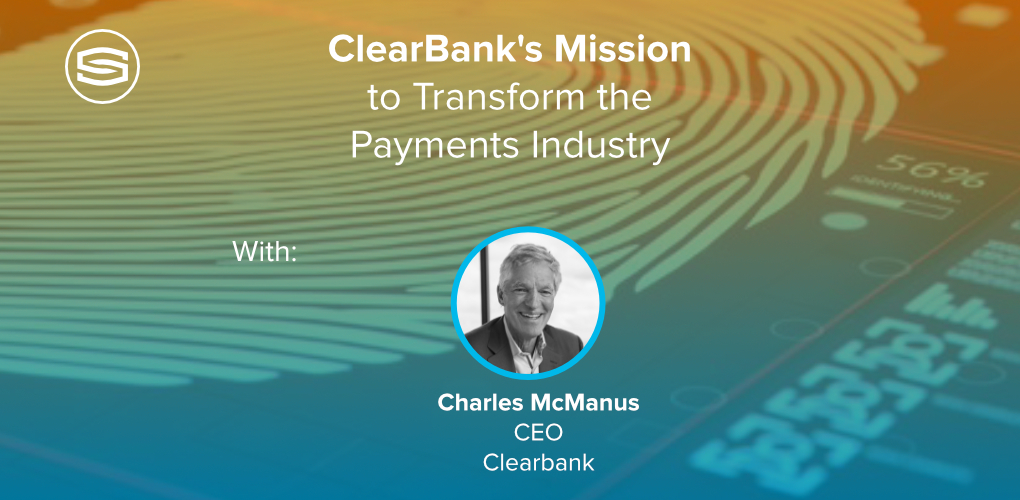
Insights & Opinions
ClearBank's Mission to Transform the Payments Industry, with Charles McManus, CEO
Tue, 18 Oct 2022


The ones that follow The Banking Scene blogs read about ClearBank's business in an interview we held at Money 20/20 with their CEO Charles McManus. A few months later, on October 6, we invited Charles again for an interactive round table session on how they are transforming the payments industry.
ClearBank is a clearing bank. That is a bank that provides third parties access to clearing services, like Faster Payments, Bacs, CHAPS, Target2, EBA Clearing etc… These third parties can also be banks, but evenly e-money institutions (EMI), credit unions, or other regulated financial institutions…
In 2015, ClearBank was the first new clearing bank in the UK in 250 years. Until then, the only clearing banks left in the UK were HSBC, Barclays, Lloyds and RBS. Unlike these, ClearBank is the only bank focusing 100% on payments and clearing services.
"It was meeting the needs of the FinTech revolution that was the main driver to create an end-to-end experience", explained Charles. ClearBank offers a service so Fintech companies can build the best front-end customer experience with the latest tech stack to participate in the payments industry, instead of relying on legacy technology of the incumbent players.
There is no financial intermediation involved (at this stage). All the money they manage is held at the Bank of England.
Charles explained that setting up a new bank of this kind was quite a challenge: "We had to manage all of the stakeholders, including the FCA, the PRA, the PSR. For connections to clearing houses, we needed a banking license before becoming a member of the payment scheme. We were applying for a banking license all the time, but we were also building this on Microsoft Azure cloud native. The FCA had not approved new bank on cloud-native technology."
With active support from the Bank of England and The Treasury to increase competition, they got their license and the required scheme memberships. Simultaneously, they eased the process for newcomers to become a direct participant at clearing houses.
ClearBank Democratised Access to Payments Services
"Today, we've got over 200 live financial institutions active on our platform and a similar number waiting to onboard, but what was that transformation? Well, at the start, it was just doing the basic product smarter, faster, cheaper, better and real-time", shared Charles.
"With the likes of Tide and other industry segments, we've moved from agency banking to embedded banking, where we're embedding our bank accounts in other’s front-end apps." That is where Charles sees the real payments transformation by ClearBank.
Third parties with bright ideas and excellent UX can embed ClearBank bank accounts into their apps, allowing EMIs to offer concrete banking services. For example, with Tide, ClearBank currently serves 420.000 SMEs (small- and medium-sized enterprises) who use the Tide platform with a ClearBank account behind the scenes.
Another speaking example is PEXA. PEXA is an Australian company with the ambition to transform the entire UK housing market and became the seventh payments scheme to achieve those ambitions. PEXA built a digital exchange and payment scheme to improve the remortgage process and conveyancing market.
ClearBank's embedded banking solution offers the account services to fulfil PEXAs dreams.
On a more personal note, Charles shared what he is most proud of during his journey at ClearBank. For him, that was the way they transformed some of the credit unions during the lockdown. Charles: “They transformed on our tech stack through Incuto and other providers. And they received letters from clients saying: we now get our money on Friday lunchtime, and we can go shopping or fill up the car with petrol or whatever it is. We've never been able to do that for the last five years.”
With more services like virtual accounts, automatic reconciliation, and digital asset accounts, this is just the start of ClearBank's mission to transform the payments industry.
ClearBank Responsibly Democratised Access to Payments Services
Charles: "As a regulated bank, we must care about AML and KYC. We need to monitor every payment that goes through us, regardless of where it comes from. We are responsible, and so are our regulated customers." Every payment must go through the required AML and KYC process of ClearBank's client, but ClearBank does precisely the same.
Although the customer is liable for AML and KYC, the reputational risk for ClearBank when something goes wrong is enormous. Charles: "We are responsible for creating the payment finality and pushing payments through the entire process."
Charles considers trust as one of the cornerstones of their business. You can have the best technology stack, but if you don't use it in a fit and proper way, it is useless technology.
That also explains the company's reason for existence, even after the market opened to new entrants. Someone raised the question, what if ClearBank’s clients become sufficiently big to connect with clearing houses directly? The company welcomes this, and they will be more than happy to keep serving clients that connect directly with Faster Payments, but prefer indirect participation for their high-value transactions, for example.
Looking ahead, ClearBank wants to be ready for a future that includes digital currencies. They already have a relatively big footprint in that segment, and they actively look at new opportunities with their clients, like Coinbase, Gemini, Ziglo… for which ClearBank does the clearing of payments.
Charles: "ClearBank holds all of its cash at the Bank of England, so 100% backed stablecoins, for example, fit perfectly with Clearbank's model. We don't want to take any of the risks. We will hold the cash 100%."
The Road to International Expansion
ClearBank's next step is global expansion, in the first instance, to better serve their existing clients, but in the future, they will be ready for new clients as well. Charles explained that this expansion has had quite an impact on ClearBank's business model.
"To get a banking license in Europe, you have to do lending. To get a US banking license, you must do lending. Their banking licenses go all the way back to banks that take deposits and lend money. That's what banks do. That's an old model. So, we will do elements of credit, or intraday facilitation for payments, and some overdraft capabilities to get our banking licenses. But it will remain a very small part of our activity and must be aligned to the payments activities and clearing."
This international expansion means that ClearBank will support multiple currencies. Consequently, when they open in Amsterdam, they plan to roll out a new service called Instaclear to move value between accounts in the UK and Europe instantly.
Charles: “We want to be the global payments and embedded banking infrastructure, the best in the world. We don't want to be the best banking financial services provider in the world. We want to be independent, so we don't compete for our customers' customers. If they bring something new to market, I won't steal that idea and start doing it in my retail or business banking arms, but we want to be the best in that space.”
And they want to do that on an international scale. Charles will also be one of the speakers at The Banking Scene Conference Brussels 2023 on May 16.


